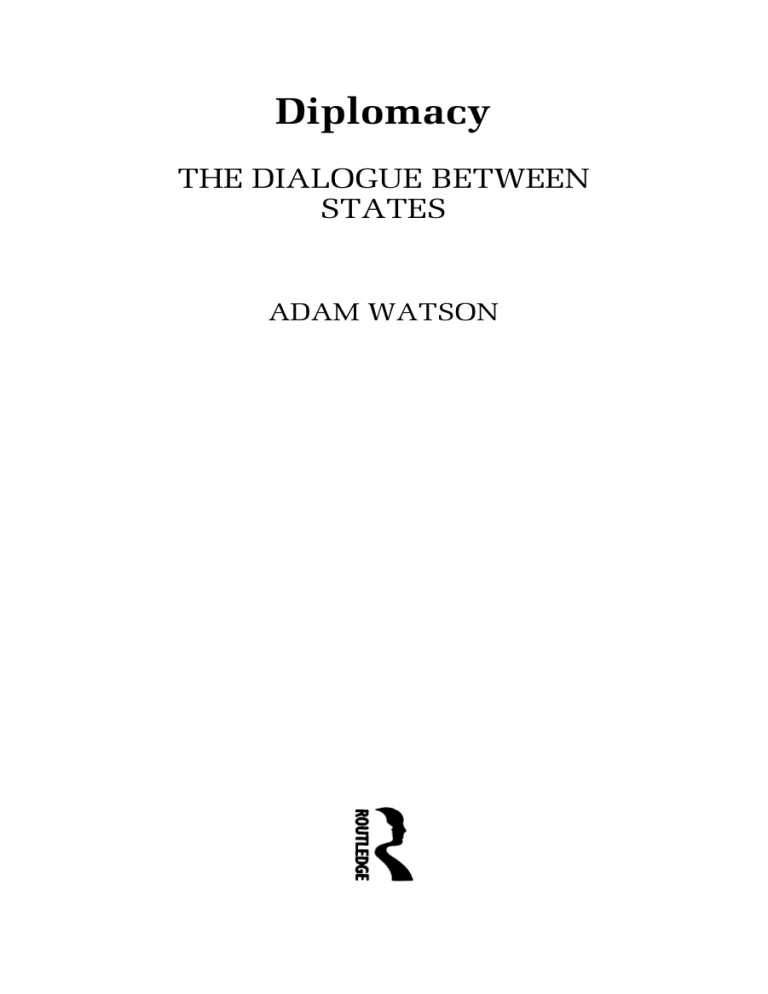
Diplomacy THE DIALOGUE BETWEEN STATES ADAM WATSON CHAPTER III Aims and Policies of States We established in the last chapter that states or political entities which wish to retain their independence, whether within their existing boundaries or by forming a community or union with some of their neighbours, are fated to communicate with other states and unions outside their own. This negotiation between political entities which acknowledge each other’s independence is called diplomacy. What then do states (including communities and unions of states) want of one another? What, as economists say, are their demands on each other and on the system? Each independent political entity has certain goals or objectives which it—or more specifically its government —wishes to achieve, certain things which the government and perhaps the people also wish to say and do. These goals, which reflect the values of the people, may be publicly proclaimed, or they may be unspoken and perhaps only half consciously held. Sometimes a government proclaims goals which are quite different from those it actually pursues. Because this is the language of politics, much is written about the policies of leaders and political parties and governments in terms of long-term goals. But a goal is something outside you, something fixed and immovable, at the end of the road or the other side of the field. Goals certainly come into the diplomatic dialogue between states, and especially into that part of it which is conducted in public. But what almost all states ask of one another in their day-to-day relations, what they discuss and negotiate with one another about most of the time, are their more immediate needs and requirements, and their responses to pressures and circumstances. Indeed, a government’s responses to pressures, its manner of coping with problems not of its own choosing, usually go far in determining its external policy. Of course the policies of a government are modified by its long-term goals and objectives, and its responses determined by its values: though often much less than governments like to proclaim. A large number of the problems which confront a government, and most of the political goals of a ruler or a party, are inward-looking and domestic. Similarly, the day-to-day policies of a government are mainly 22 DIPLOMACY concerned with the internal affairs of the state which it governs. The reason why governments value independence so highly is because they want to be able to take these internal decisions themselves. In the modern world the government is the ultimate and decisive authority inside a state; and as the power of the state (that is, the government) over all activities within it increases, so it becomes more absolute in the sense that its decisions determine what shall happen in matters that are within its control. More particularly, inside its own domain a government can make laws and issue edicts, in the expectation that they will be generally obeyed, even if sometimes grudgingly; and it has means of law enforcement to compel those who disobey. But in so far as the problems which face a government are due to causes outside its boundaries, in so far as what other states do affects its problems, and indeed its policies and its goals, and in so far as its policies affect other states, we say a government has a foreign policy. Aussenpolitik (outward policy) is the useful German term. In the field of outward policy the position of a government is entirely different from its position at home. A state is not normally strong enough, or for a number of reasons is unable or unwilling to use its strength, to coerce other states to behave as it wishes. And since if it did, the other states concerned would not be meaningfully independent, we may broadly say that by definition an independent state is compelled to negotiate and bargain with other states on all matters where the policies of other states affect its own. Sometimes negotiation fails, of course, and states resort to force. But not all the time, and not with all other states. Most of the time states further their interests, and make their demands on the system and respond to its pressures, by negotiation. There have been periods of history when the political entities in a certain area had so little contact with one another that they hardly had need of outward policies. But the more closely knitted together a system or society of states is, and the more interdependent the individual states in that society are, the more each will be affected by the outward policies of the others, and the more obliged it will be to take account of them and to enter into a dialogue with them, whether it wants to or not. The world as a whole has never been so closely knit, so interdependent, as it is today. Consequently there is today more diplomacy, and it is more complex, than ever before. It is a matter of common observation that the interests and principles, and the goals, of states differ: that each state has a distinct outward policy. Only in imaginary models designed by political scientists for the purposes of study do all the states in a system have the same policy towards each other. The main reason for these differences is that the outward policy of each state is largely determined for it by the needs of the area concerned and of the people who live there. Thus, for instance, AIMS AND POLICIES OF STATES 23 every government of Mauritius will be concerned to sell its sugar at a good price; every government of Russia will want to ensure safe passage through the straits out of the Black Sea; every government of Britain has to ensure imports of huge quantities of food and raw materials. But there is also an area in the outward policy of any state which is not determined in this way but open to choice. This area of choice varies according to the circumstances of each state, and is usually much more limited than is often supposed; but it receives a great deal of attention precisely because it is a matter of choice, and therefore of controversy. Choices are possible about some long-term goals, but more usually they involve decisions about reactions to external events and pressures, and methods of responding to them, including ultimately involvement in war. Every state, whether comparatively insulated from others or highly interdependent, is above all concerned to preserve the right and ability to take its own decisions, that is its independence. This is not to say, of course, that every state or political entity wishes to stay exactly as it is, in composition and territorial extent. Certain small states, and especially their populations, are willing to merge into a larger, equally independent state. Sometimes quite large countries want to do this, especially where the populations feel that they belong to the same nation or group. The German and Italian states pooled their independence and their sovereignty in the nineteenth century to form two large nation-states. Perhaps the Arab states, or those of Western Europe, may do the same tomorrow, and agree to share in the decisionmaking processes of a larger state. Indeed from ancient times many groups of similar states have merged or formed unions in order to defend their collective independence more effectively. Similarly, groups or nations which are incorporated in existing states like the United Kingdom or India, may have the will and the opportunity to secede and to form smaller states on their own. In all these cases, new states emerge, and the desire to preserve independence from other states which people consider to be outside their own entity remains as before. The desire of every political entity to look after its own interests and take its own decisions arises from the fact that the interests of different states and groups differ. It is wholly false to suppose that the interests of different groups of people do not, or need not, ever conflict. If states were replaced by other structures, these conflicts of interest would remain. However, this does not mean that interests are irreconcilable. Interests can be harmonized, or reconciled, or fairly divided by consent, as well as maintained in the teeth of opposition. What this means is that, to take our first example, the people of Mauritius, who live mainly by producing sugar, want to get as many other goods as possible in exchange for their sugar. In Western economic terms they want as high 24 DIPLOMACY a sugar price as they can get; whereas the foreigners who consume the sugar and export manufactured goods in return want to pay no more than they have to. Sugar may be an easier issue to settle than oil, but it is the principal export of many countries today, and a great deal of negotiation and bargaining, a great deal of diplomacy, goes into determining sugar prices and quotas. In this as in all the other issues of modern diplomacy, each state concerned wishes to take its own decisions and defend its own interests. For instance, the major practical justification of the independence of small, underdeveloped countries from colonial and neo-colonial rule is that their interests are not as well served by leaving their vital decisions in the hands of others. The principal concern of each state, then, is to preserve its own independence. In a system of states where the policy of each affects the others, many states recognize that they have a joint interest in maintaining their independence; and they come to see in the independence of their fellow members the means to preserve their own. It is not necessary that every state should attach importance to preserving the independence of every other state, nor that it should formally recognize all other states as having the same moral right to a separate existence as it claims for itself. For example, governments committed to national unification are apt to consider certain existing states to be entities which are destined to disappear, either by absorption or by partition. But even in the case of revolutionary regimes, and especially those on the defensive, the maintenance of one’s own independence is soon seen to involve some recognition of that of others (though not necessarily all others). It is clearly shortsighted of a state to concern itself with the preservation of its own independence only, while a more powerful neighbour establishes its domination over other states, for sooner or later its turn is likely to come, and it may not be strong enough to withstand alone that increasingly powerful neighbour. From this practical and vital involvement in the independence of other states, the concept develops that states have a general right to be independent, and that those which want to exercise this right have an interest in supporting each other in asserting it. So states in systems come to recognize that the mutual acceptance of the principle of independence, even with exceptions, is a necessary condition of a society of states, and that diplomatic intercourse between them must therefore be based on this acceptance. Recognition of independence, where it exists, both in practice and of right, is a prerequisite of diplomacy. For a state must recognise that other states are able and entitled to take their own decisions if it is to communicate and negotiate with them effectively about how they will act. AIMS AND POLICIES OF STATES 25 The independence of all the states in a system is compatible, just as within a state the rights of political parties are compatible with one another. This concept of compatibility is important for all collective diplomacy, and it applies to other aspects of international life which most states regard as highly desirable, though they are not prerequisites of a diplomatic dialogue, as independence is. For instance, peace and security are not essential preconditions of diplomacy. Diplomacy can be very active even in wartime: within an alliance, and with neutrals, and between the warring states in order to bring the war to an end. Peace and security are not the same; and though they are bracketed together in the Covenant of the League of Nations and in the U.N.Charter, even there concepts like ‘enforcing the peace’ and ‘military sanctions’ clearly illustrate that the maintenance of security may require the capacity and the perceived will to use military force. But peace and security are like independence in that they are also compatible. Every state can work for them without denying them to other states; and diplomacy can aim to establish and maintain them on a universal and collective basis. Therefore when we say that in an international society or system of states independence, and peace, and security are compatible, we mean that broadly speaking the states which desire these conditions can all attain them at once. Similarly we may say by extension that there is a wide range of issues where the interests of states differ and indeed conflict, but where solutions can be found which both parties find it in their interest to accept. For instance, if we take again the issue of sugar, there is a price at which it is in the interest of the seller to sell and the buyer to buy. Since trade is mutually beneficial, the interests of the buyer and seller are opposed but not incompatible. If all the states in a system, all the political entities in an international society, had only compatible purposes, diplomacy would involve a great deal of hard bargaining, and perhaps some ill feeling between competitors, but there would be no serious threat to peace and order in the international community. However, in the real world not every state, and certainly not every active political entity, has peaceful and compatible aims and policies. There are at present and always have been a number of states, and of political entities that do not quite have the international position of recognized states, which consider that the world is wrongly ordered and is unjust either in general or in some particular. They do so for a number of reasons. They may have revolutionary governments, or at least governments who consider it their duty to change the way in which other states are governed (e.g., to spread communism, or democracy, or a religion like Islam). Or another state may occupy territory which they consider ought rightfully to be theirs. Or they may demand equal opportunities for trade and expansion which other states 26 DIPLOMACY monopolize (this was the complaint of Japan between the two world wars). Or they may be rebel movements that wish to set up new and independent states or gain control of existing ones. All these aims and demands, and other similar ones, have been considered legitimate, and indeed heroic and praiseworthy, by different peoples at different times. So far as diplomacy is concerned, what matters is that all of them are incompatible with the interests and demands of some other state or states. There are two great difficulties about incompatible demands. The first is the ‘subjectivity’ of controversial values. Independence, and peace, and the price of sugar, are for practical purposes objectively definable. Diplomats talking about such matters have no great difficulty in agreeing what is meant, even though concepts like independence and peace are not absolutes but mean rather different things in different contexts. Some incompatible demands are equally definable, especially concrete ones like claims to territory. But a demand for justice, a plea for a wrong to be righted, are based on subjective judgements, on which there is normally no agreement. The state against which the demand is made will probably regard it as unjust, using other criteria which are also controversial. For instance, if we take the dispute between the United Kingdom and Spain about Gibraltar, both sides have criteria of their own, according to which they are in the right. A decision by the International Court that Gibraltar is legally British would not convince the Spaniards; and votes by the General Assembly of the U.N. in favour of Spain have not convinced the British. The second and even greater difficulty about incompatible demands derives from the fact that where a state or political entity feels very strongly about what it considers to be an injustice, it or at least certain of its members tend to resort to violence in order to correct the wrong. This is especially true when the criteria or values on which one state or group bases its claim are not universally accepted. The history of Palestine over the last sixty years is a good illustration of this difficulty. If peace were to be the supreme goal of all states, and there were to be no recourse to war or other forms of violence in order to right wrongs or to change the world, then only those wrongs could be righted and only those adjustments made which a state could be induced to accept without the use of force. It is true that the values of states change; and that a state may sometimes be persuaded to yield by argument, because its government and people acknowledge the justice of the case brought against it. For instance, imperial states may freely, and without the use of force, grant independence to colonies—as Britain, France, Spain and other countries have done. Or a state may be induced to give way by other member states of the international system applying pressure short of force, such as economic sanctions. But in practice such changes are AIMS AND POLICIES OF STATES 27 limited. The renunciation in advance of the use of force in order to right a proclaimed ‘injustice’ is recognized in practice as a diplomatic formula weighted heavily in favour of the status quo. So peace, the exclusion of violence by one political entity against another, is essentially the policy of satisfied states, weak states and states which consider that the changes they really care about can be achieved by diplomacy and the help of their friends without recourse to violence. Peace, then, does not mean a condition in which there are no conflicts between the needs, demands and goals of states, for these are always present. It means—in the United Nations Charter, for instance, and in common usage—a condition where states and political entities do not use violence against one another in pursuit of their incompatible goals. War is a highly concentrated and specialized form of violence between states. It is usually on a much larger and deadlier scale than other forms of violence, and is also usually subject to certain rules and conventions, like the treatment of prisoners, which other forms of international violence do not respect. But like other forms of planned and organized violence it is a means to an end. Political entities do not resort to force for pleasure, though some individuals may enjoy the thrill and excitement of violence and war. They resort to force in order to attain a political goal: for instance, in order to correct what they consider an unjust or unfair situation, or to defend what they consider just and right against violence by others. In order to understand this crucially important aspect of international affairs, and the role which diplomacy can play in it, we must therefore next examine in more detail, first, subjective ideas of justice, and the conflicts to which incompatible ideas of justice give rise; and then the general relation of diplomacy to force.



